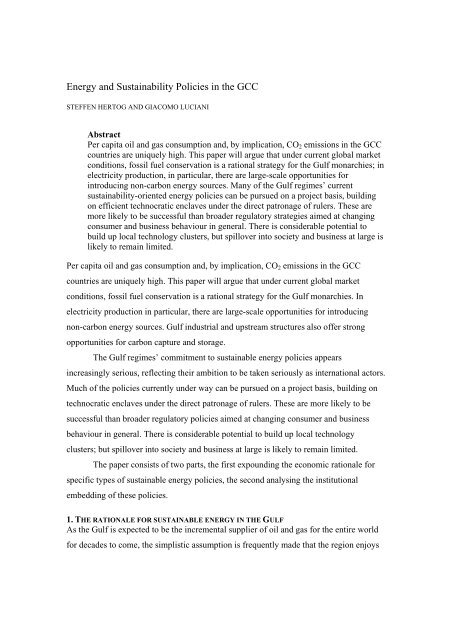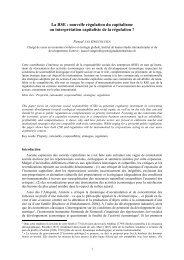PDF - Graduate Institute of International and Development Studies
PDF - Graduate Institute of International and Development Studies
PDF - Graduate Institute of International and Development Studies
You also want an ePaper? Increase the reach of your titles
YUMPU automatically turns print PDFs into web optimized ePapers that Google loves.
Energy <strong>and</strong> Sustainability Policies in the GCC<br />
STEFFEN HERTOG AND GIACOMO LUCIANI<br />
Abstract<br />
Per capita oil <strong>and</strong> gas consumption <strong>and</strong>, by implication, CO 2 emissions in the GCC<br />
countries are uniquely high. This paper will argue that under current global market<br />
conditions, fossil fuel conservation is a rational strategy for the Gulf monarchies; in<br />
electricity production, in particular, there are large-scale opportunities for<br />
introducing non-carbon energy sources. Many <strong>of</strong> the Gulf regimes’ current<br />
sustainability-oriented energy policies can be pursued on a project basis, building<br />
on efficient technocratic enclaves under the direct patronage <strong>of</strong> rulers. These are<br />
more likely to be successful than broader regulatory strategies aimed at changing<br />
consumer <strong>and</strong> business behaviour in general. There is considerable potential to<br />
build up local technology clusters, but spillover into society <strong>and</strong> business at large is<br />
likely to remain limited.<br />
Per capita oil <strong>and</strong> gas consumption <strong>and</strong>, by implication, CO 2 emissions in the GCC<br />
countries are uniquely high. This paper will argue that under current global market<br />
conditions, fossil fuel conservation is a rational strategy for the Gulf monarchies. In<br />
electricity production in particular, there are large-scale opportunities for introducing<br />
non-carbon energy sources. Gulf industrial <strong>and</strong> upstream structures also <strong>of</strong>fer strong<br />
opportunities for carbon capture <strong>and</strong> storage.<br />
The Gulf regimes’ commitment to sustainable energy policies appears<br />
increasingly serious, reflecting their ambition to be taken seriously as international actors.<br />
Much <strong>of</strong> the policies currently under way can be pursued on a project basis, building on<br />
technocratic enclaves under the direct patronage <strong>of</strong> rulers. These are more likely to be<br />
successful than broader regulatory policies aimed at changing consumer <strong>and</strong> business<br />
behaviour in general. There is considerable potential to build up local technology<br />
clusters; but spillover into society <strong>and</strong> business at large is likely to remain limited.<br />
The paper consists <strong>of</strong> two parts, the first expounding the economic rationale for<br />
specific types <strong>of</strong> sustainable energy policies, the second analysing the institutional<br />
embedding <strong>of</strong> these policies.<br />
1. THE RATIONALE FOR SUSTAINABLE ENERGY IN THE GULF<br />
As the Gulf is expected to be the incremental supplier <strong>of</strong> oil <strong>and</strong> gas for the entire world<br />
for decades to come, the simplistic assumption is frequently made that the region enjoys




